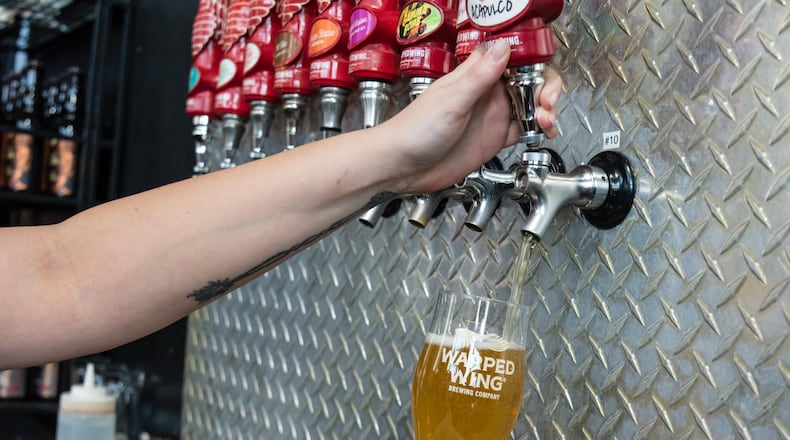Late in May, the Ohio Craft Brewers Association formed what it calls the “Brewers Freedom Alliance,” to advocate for exempting small craft brewers from the state’s 1974 franchise law, allowing small brewers to negotiate directly with wholesalers, the businesses that deliver their bottles, cases and kegs to stores, bars and market outlets.
Modernizing a law that was born in a very different era — decades before the proliferation of hundreds of craft brewers across the Buckeye State — would give brewers the ability to make decisions for their own businesses, the alliance says.
As Mary MacDonald, president of the Ohio Craft Brewers Association, describes it, Ohio’s craft brewers want to negotiate contracts with wholesalers under what brewers see as normal contract law, without reverting to what they see as an outdated franchise law.
Credit: Tom Gilliam
Credit: Tom Gilliam
“I just want to be able to write a contract, negotiate a contract that is enforceable under regular contract law that doesn’t default to franchise law, with the automatic renewal and all the other things that come with franchise law,” MacDonald said.
In the early 1970s, the franchise law was created to protect small “mom and pop” wholesalers working with a relatively small number of large brewers. There were perhaps 116 breweries across the entire nation at the time, with close to about 200 wholesalers just in Ohio, MacDonald said. At that time, each wholesaler perhaps represented one brand in each county, she said.
If a manufacturer stopped making a particular brand, a wholesaler could go out of business.
Nearly five decades later, in terms of relative size and market heft, those roles have reversed — there are more than 420 breweries in Ohio and a few big wholesalers.
Wholesalers — which get a percentage of retail sales — tended to consolidate and grow over the years. Heidelberg in Moraine operates across Ohio and into Kentucky today. (Heidelberg’s owners in 2021 agreed to sell to Redwood Capital Investments in a deal reported to be close to $1 billion in size.)
Credit: CONTRIBUTED
Credit: CONTRIBUTED
“If they’re not getting satisfactory service from their wholesalers, they (brewers) can ask them what they can do about it, they can try to get them to fix it,” MacDonald said. “But at the end of the day, because these contracts are automatically renewed ... the small breweries are stuck. You have no recourse to get them to do what you need them to do.”
Nick Bowman, co-founder of Dayton’s Warped Wing brewery, said updating the law would be meaningful, not just for his company but for all craft brewers.
“What we’re asking for is exclusion from the franchise law. We understand why it was put into place back in 1974,” he said.
Bowman emphasized that Warped Wing has no complaints about the wholesale partners it has today.
“We have some great distributor partners that we love working with,” he said. “But there are some scenarios out there where partnerships don’t work out.”
The state association wants an exclusion from the franchise law for brewers who brew up to 250,000 barrels a year. Warped Wing will brew between 7,000 and 8,000 barrels this year, Bowman said.
Jacob Evans, counsel for the Wholesale Beer and Wine Association of Ohio, said the current distribution model works.
If there are problems, brewers and wholesalers are free to sit down and work them out. If the difficulties can’t be resolved, the two sides can work together with a new wholesaler to establish a new distribution partnership.
As in any business or contractual relationship, recourse to the courts can be a last resort, Evans said.
“The proposal the craft brewers have put forward would exempt all craft brewers in the state of Ohio,” Evans said. “It would only apply to Anheuser-Busch, MillerCoors (Molson Coors), Boston Beer Co., and it would apply to 99% of all brewers across the United States. That’s not a carve-out. That’s removing everybody from the law.”
“That absolutely does change the relationship between the wholesaler and all their supplier partners,” he added.
Nearly 1.2 million barrels of craft beer were brewed in Ohio in 2021, making Ohio the fifth most productive state for craft beers that year. Craft brewers had an $880 million impact in 2020, the first year of the pandemic, down from $967 million in 2018, according to the association.
But that impact has grown. Last year, the industry’s economic impact was closer to $1.2 billion, MacDonald said.
According to a 2022 U.S. Treasury report, there were then more than 6,400 breweries in the United States, up from fewer than 90 in the late 1970s, and more than 6,600 operating wineries. There are also more than 1,900 operating distilleries, Treasury said that year.
About the Author



